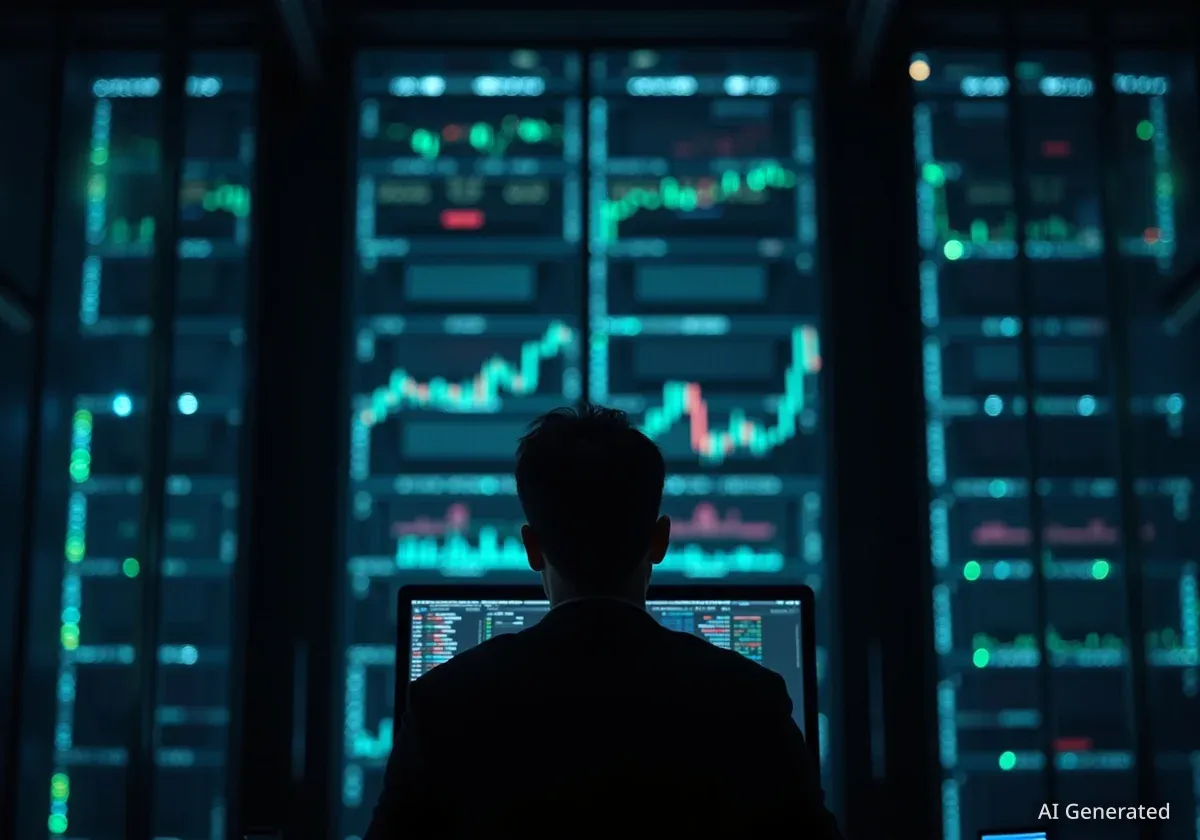A proposed $100 billion strategic partnership between chipmaker Nvidia and research lab OpenAI is intensifying debate over whether the artificial intelligence sector is in a speculative bubble. The deal, which involves Nvidia investing in OpenAI in exchange for a massive chip order, has prompted analysts to draw parallels with the dot-com era of the late 1990s.
While the investment has boosted Nvidia's share price, it has also attracted scrutiny from legal and market experts. They question the circular nature of the transaction and warn of potential anti-competitive behavior, raising concerns that the current AI investment boom may be driven more by hype than by tangible economic returns.
Key Takeaways
- Nvidia plans to invest $100 billion in OpenAI for non-voting shares.
- In return, OpenAI will purchase up to five million of Nvidia's advanced processors (GPUs).
- Analysts and legal experts have raised concerns about potential anti-competitive practices and regulatory scrutiny.
- The deal is being compared to the speculative investments and reciprocal deals of the dot-com bubble.
- Studies suggest many corporate AI projects have yet to deliver a return on investment, fueling skepticism about the sector's valuation.
Details of the Nvidia and OpenAI Agreement
The proposed strategic partnership between Nvidia CEO Jensen Huang and OpenAI CEO Sam Altman outlines a significant financial and operational arrangement. Nvidia intends to invest $100 billion into OpenAI through incremental payments. In exchange for this capital, Nvidia will receive non-voting shares in the AI company.
As part of the agreement, OpenAI has committed to purchasing up to five million of Nvidia's highly sought-after GPUs. This volume is roughly equivalent to Nvidia's total processor shipments for an entire year. The deal structure specifies that Nvidia will release funds as OpenAI builds out its planned 10 gigawatts of data center capacity, which is necessary to power its advanced AI models.
The announcement of the partnership led to an immediate 4% increase in Nvidia's share price. However, the structure of the deal, where an investor's funds are used to purchase its own products, has been described by some as circular.
A Web of AI Alliances
This deal is part of a broader trend of large technology companies forming tight alliances. Microsoft, Meta, and Alphabet are all engaged in similar activities, often structuring deals to remain just below the thresholds that would automatically trigger regulatory investigations. For example, Meta acquired a 49% stake in the data-labeling firm Scale AI for $14.3 billion, avoiding a full takeover review.
Regulatory Scrutiny and Competition Concerns
The close relationship between the dominant AI chip supplier and a leading AI model developer is expected to attract attention from global regulators. Legal experts anticipate that agencies like the U.S. Federal Trade Commission (FTC), the European Commission, and the UK’s Competition and Markets Authority (CMA) will closely examine the partnership's implications.
Alex Haffner, head of competition at the law firm Fladgate, stated he expects regulators to look very closely to see "whether it provided an incentive for Nvidia to favour OpenAI over other customers."
A primary concern is that Nvidia, as a part-owner of OpenAI, might give preferential treatment to its partner. This could involve offering better pricing on chips or prioritizing OpenAI's orders over those of competitors, who are also reliant on Nvidia's technology. Such actions could stifle competition in the rapidly growing AI market.
Thomas Thiele, a consultant at Arthur D Little, referred to the deal as a "strategic lock-in." He noted that by becoming OpenAI's preferred partner, Nvidia makes it less likely for OpenAI to explore alternative processors from competitors like AMD or Intel.
Echoes of the Dot-Com Bubble
For many market veterans, the current frenzy of AI investment bears a striking resemblance to the technology bubble of 1998-2000. During that period, stock valuations soared based on announcements and partnerships rather than on actual earnings or cash flow.
Market Influence by the Numbers
- In 2024 alone, Nvidia's 171% stock surge accounted for over 22% of the S&P 500's total return.
- According to Deutsche Bank, without tech-related infrastructure spending, the U.S. economy might be in or near a recession this year.
Russ Mould, investment director at AJ Bell, commented that investors with long memories would view the Nvidia-OpenAI deal with caution. He drew a direct parallel to the dot-com era, when established companies like Lucent and Nortel invested heavily in startups, booking huge sales for their equipment. These arrangements often unraveled when the promised growth failed to materialize.
"The telecom and internet service providers WorldCom and Global Crossing built far too much capacity and engaged in reciprocal deals, or ‘capacity swaps’, where services were offered and taken but no cash actually changed hands," Mould explained. All four of those companies eventually failed or were acquired at much lower valuations.
Questions About AI's Real-World Value
Underpinning the bubble concerns are growing questions about whether generative AI is delivering on its promises of transformative productivity gains. The current economic boost is largely from the construction of data centers, not from the widespread, efficient application of AI technology itself.
Several reports have cast doubt on the return on investment for AI projects. A study from MIT found that 95% of corporate generative AI initiatives do not deliver a positive return. Furthermore, the Harvard Business Review has highlighted the problem of "workslop"—low-quality, nonsensical content generated by AI—which can actively damage productivity.
The public response to recent AI model updates, such as ChatGPT-5, has also been mixed, with many users finding it underwhelming compared to earlier versions. This sentiment adds to the skepticism that the technology's current capabilities justify the massive investments being made.
The Path Forward for the AI Industry
Despite the skepticism, many in the industry remain optimistic about AI's long-term potential. Suranga Chandratillake of Balderton Capital compares the current moment to the beginning of the internet or smartphone eras, which were initially met with similar doubts. He anticipates a "pullback on the AI boom" but believes the overall growth trajectory will continue.
The central question is whether the close relationships forming between AI giants will lead to better, more affordable AI solutions for everyone or simply consolidate power and increase costs. As regulators around the world debate how to approach this new ecosystem, the largest players continue to strengthen their positions.
The risk is that if the promised productivity gains from AI do not materialize soon, the current investment bubble could pop. Such an event could have significant consequences, not just for the tech sector but for the broader economy that has become increasingly dependent on its growth.





